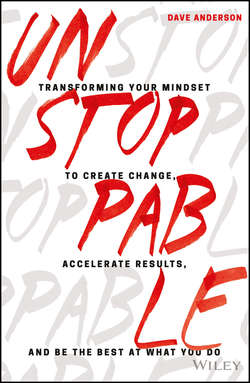Читать книгу Unstoppable - Anderson Dave - Страница 9
На сайте Литреса книга снята с продажи.
CHAPTER 2
THE CARETAKER
Drop the Excuses
ОглавлениеWhat is worse than choosing to do less than you can is the reasoning that some use to justify their own caretaker performance, or the mediocrity of others:
“I do what I'm supposed to do. I do my job.”
“I'll do more when they pay me more.”
“My boss/coach doesn't motivate me.”
“At least I'm here every day.”
“He's not great, but he's better than nothing.”
“Well, she is at least reliable.”
“I've seen worse.”
This stinking thinking is the lament of losers – the verbal vomit known as excuses. Excuses are the DNA of underachievers, and pretty much guarantee that you will spend a lot of your work life, and life overall, in caretaker status. Excuses are just a plea offered to explain away a fault or failure. They are an absolution of responsibility. Excuses make you common, undesirable, and ultimately average, ordinary, and not outstanding. If I may be so blunt, they also make you repulsive. No one wants to be around someone who makes excuses —NO ONE.
Johnny Gyro is my karate instructor and has trained me to the rank of second-degree black belt. Master Gyro is a ninth-degree black belt in Tang Soo Do karate who has trained in the martial arts for five decades. He dominated the 1980s as its top-ranked fighter, is in martial arts halls of fame, holds black belts in five additional martial arts, and has been an instructor for more than three decades training and developing hundreds of black belts. Master Gyro was a member of the United States Fight Team for six years, and its captain for three years. His 29-time winning record of the annual International Karate Championship stands in a league of its own. This unstoppable game changer decided early on that excuses were the language of mediocrity – a futile exercise he wouldn't stoop to engage in. That decision was a catalyst in separating him from the hordes of caretakers in his field, and in elevating him to the eventual status of game changer.
From the start, I refused to waste my time making any excuses for myself and I rejected the option to fall victim to useless “reasons” why I didn't win a fight if I lost. Instead, I remained fixated on focusing on my direction. I always had my target in sight. It was always on my mind and I kept that tunnel vision in the forefront of my thoughts to keep my drive alive on what I planned to achieve. It didn't matter who I fought or where I fought because I competed across the USA and through Canada, Mexico, and Central America. A second-place victory was not a victory in my mind. While some gifted karate fighters considered second place a win, I did not because, in my mind, first place was the only win that mattered. Anything less was merely participating in a fight, because coming in second wasn't going to get me where I needed to go. I was not willing to settle for second best, and knowing there were no shortcuts was fine with me. I wanted to earn my titles because I wasn't interested in finding ways around that. I went about learning how other tough fighters trained, how they prepared for the ring. If a winning fighter trained by doing 500 kicks a day with ankle weights on, I did 1,000 kicks with ankle weights. Fighting was as much a mental game as a physical game. Strategy mattered, knowledge mattered, and I learned how to become a smart fighter. Physical training can only take you so far. The mind drives the desire and the body follows. The true definition of a fighter is one who understands his challenge and knows how to simultaneously train the mind and the body to conquer the challenge (Johnny Gyro, pers. comm.).
To change your results, change your behaviors. To change your behaviors, change your thinking. To change your thinking, change what you think about. To think about the right things, renounce excuses and focus on what you can control.
